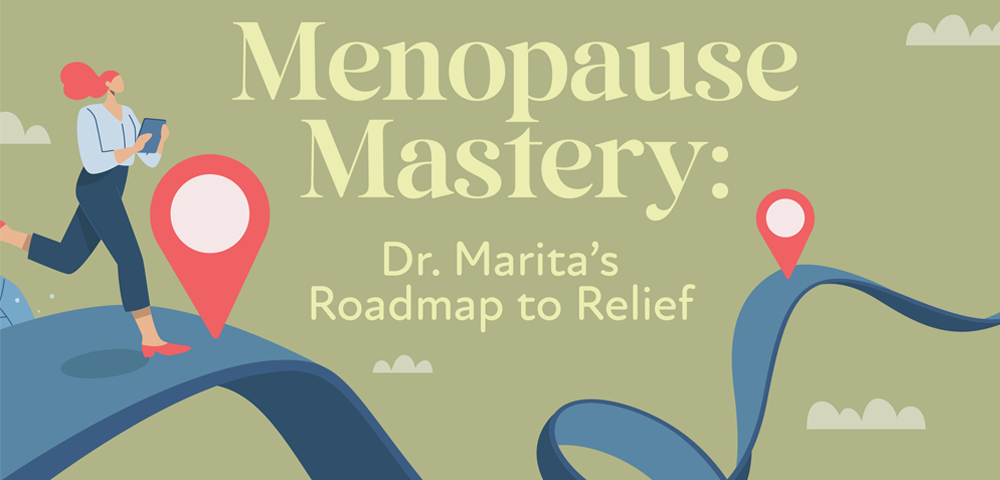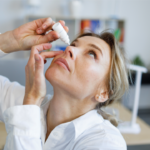
Let’s explore my approach to preparing for and navigating menopause.
As a naturopathic doctor, I couldn’t be happier that the mainstream conversation around menopause and perimenopause is changing. It’s about time! For decades, women have been told to “just deal with it,” that their often highly disruptive symptoms are just a “normal” part of this phase of life, or even that it’s all in their heads. Let’s explore my approach to preparing for and navigating menopause, which supports women through this shift so they can reclaim their vitality and feel like themselves again (or maybe even better).
The new hormonal conversation
One of the most important shifts I’ve seen in recent years is the emphasis on education. For a long time, women weren’t being educated by their health care practitioners about what was happening in their bodies during perimenopause and menopause. This isn’t a quick blip on the radar; it’s not a death sentence to your womanhood. It’s a process that can start as early as your late 30s or early 40s.
So, what’s really happening biologically in perimenopause and menopause? During perimenopause, the ovaries begin to become less responsive to signals from the brain (specifically, the pituitary gland’s release of hormones follicle-stimulating hormone [FSH] and luteinizing hormone [LH]). As a result:
- Estrogen and progesterone production becomes irregular, sometimes too high, sometimes too low, leading to symptoms like breast tenderness, heavy or missed periods, mood changes, and sleep issues.
- Ovulation becomes less consistent, which means progesterone (which is only produced after ovulation) often drops earlier and more dramatically than estrogen. This estrogen-progesterone imbalance is what drives many classic perimenopausal symptoms.
In menopause, ovulation stops completely. This means:
- Estrogen and progesterone levels fall to very low, but stable levels.
- FSH levels rise as the body tries unsuccessfully to stimulate the ovaries.
- The body must rely more on the adrenal glands and fat tissue for small amounts of estrogen, which is why adrenal health is crucial at this stage.
The hormonal fluctuations of this stage affect everything: sleep, mood, memory, skin, weight, libido, digestion, and energy levels.
Foundational support: The steps we can never skip
Here’s what I’ve learned after working with hundreds of women in all phases of life: no matter where you are on your hormonal journey, key foundations make a world of difference to your body’s ability to regulate your hormones.
- Diet is medicine
Food either fuels your vitality or depletes it. I guide my patients toward an anti-inflammatory, blood-sugar-balancing, whole food way of eating: lots of leafy greens, fiber-rich veggies, clean proteins at every meal and snack, healthy fats, and hormone-loving foods like flax, pumpkin, and sesame seeds. We reduce alcohol and caffeine (I know… but trust me) and steer clear of processed foods that wreak havoc on already-sensitive hormones.
- Lifestyle is the container
Sleep, stress management, and movement aren’t optional. We practice good sleep hygiene to improve the quality and duration of rest by shutting off screens an hour before bed and winding down. We engage in daily, gentle, consistent movement to support mood, metabolism, and bone density. We practice stress management through meditation, breathwork, and some key stress-busting supplements (more on this below).
Further support for your body’s natural transition
- Adrenal support is a game-changer
Your adrenals play a massive role in hormone regulation as your ovaries slow down. When you’ve been running on empty (hello, modern go-go-go), we support those tired adrenals with stress-busting herbs like ashwagandha and rhodiola, B vitamins, and lifestyle changes that put you back on the priority list.
- Foundational supplements that make all the difference
• Vitamin D3 for mood, immunity, and hormone support
• B12 to support energy and nervous system health
• Magnesium glycinate/bisglycinate for sleep, anxiety, muscle recovery, and hormone balance
• Omega-3s to reduce inflammation and support mood, skin, and brain health
- Lab work gives us the roadmap
We don’t guess, we test. I often recommend checking:
• Thyroid function (TSH, free T3, free T4)
• Blood sugar and fasting insulin
• Iron and ferritin (low iron can tank your energy)
• In some cases, hormone panels to assess estrogen, progesterone, testosterone, DHEA, and cortisol levels can be beneficial
We can create a personalized plan when we gather this information because every woman’s hormonal journey is unique.
You deserve to feel amazing
Let me be crystal clear: you do not have to suffer through perimenopause or menopause. You are not crazy, broken, or too late. You’re entering one of the most powerful phases of your life – and with the proper support, it can be your most radiant yet.












